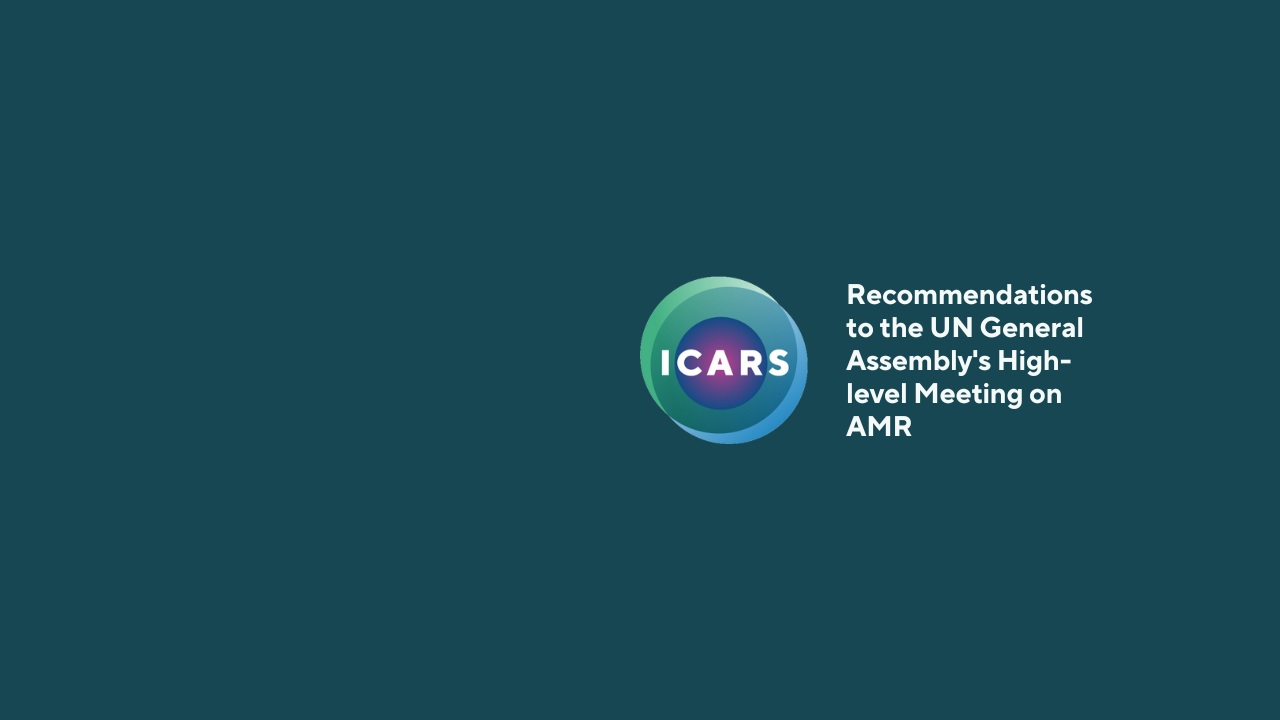In September 2024, recognising the critical importance of antimicrobial resistance (AMR) and its impact, the UN General Assembly (UNGA) is convening a High-Level Meeting (HLM) to discuss and agree on a political declaration to inform future actions on AMR. This HLM on AMR was convened following the adoption of Resolution 76/257 (March 2022), titled ‘Global health and foreign policy: elevating pandemic prevention, preparedness, and response to the highest level of political leadership’. It aims to build on the commitments and progress that followed from the UNGA HLM on AMR in 2016 and adopt a second political declaration to support Member States and other stakeholders accelerate response and progress mitigating AMR.
Throughout 2024, ICARS has and will continue engaging in national, regional and global dialogue to feed into the HLM Political Declaration drawing on its experience over the past five years partnering with 21 Low- and Middle-Income Countries (LMICs) in their efforts to address AMR.
ICARS recommends that the UN Member States:
- Promote science-policy-implementation dialogue and interface: Despite the wealth of knowledge and evidence generated over the past decade on AMR burden and potential interventions and solutions to be supported, a significant gap remains between evidence and policy development and implementation. That is a critical issue in most countries, including Low- and Middle-Income Countries (LMICs), where policy fails to address the existing research and evidence. A research agenda practising a bottom-up (investigator-driven), top-down (policy-driven) approach across all layers of governance can bridge that gap.
- Support setting up a sustainable ecosystem of evidence and innovation generation: While novel approaches contribute to the understanding of AMR burden and development of proper solutions, the UNGA policy recommendations should also consider a more holistic approach to research and innovation across the entire ecosystem, from observational research to final product and policy change. That should mobilise a range of sectors, taking a multidisciplinary approach to achieve better outcomes. Not least, funding is essential at all stages. We believe AMR National Action Plan (NAP) implementation should prioritise intervention and implementation research in line with the Quadripartite AMR One Health Priority Research Agenda. That would require strengthening the relevant in-country research capabilities for contextualised solution uptake into policy.
- Advocate for context-specific and country-owned solutions: UNGA should consider a more refined model in their recommendations. Countries, especially LMICs, should define the priorities, AMR agenda and solutions relevant to their settings. Therefore, solutions to mitigate AMR should be context-specific and country-owned, as countries have a better understanding of their vulnerable populations and the different sector priorities affected by AMR. Working nationally with a range of partners, including local communities and the private sector, would amplify the understanding of the local burden and support efforts to develop solutions informed by their needs and relevant to those impacted.
- Approach AMR as a horizontal challenge: AMR is a cross-cutting issue that impacts multiple dimensions of sustainable development, including health, agriculture, food, water, economy and more. Tackling AMR requires a holistic and collaborative approach to align efforts with the broader agenda of achieving the Sustainable Development Goals. AMR mitigation should be seen as an integrated part of many other aspects of One Health system strengthening initiatives, such as vaccination, biosecurity, infection prevention and control, WASH, pandemic preparedness, sustainable food systems, waste management, access to healthcare and diagnostics, pooled procurement of medicines etc. We urge UNGA to recognise this and position AMR as a horizontal challenge leveraging efforts across other priorities.
- Strengthen global governance and leadership: The global/national governance and AMR leadership matrix should be revisited based on the changing dynamics within countries. There needs to be a clear path for accountability to maximise the impact of the UNGA recommendations. We emphasise the importance of developing a clear plan for translating these commitments into action after the high-level meeting. Establishing an independent panel that will gather and evaluate evidence to inform decision-making is critical in ensuring AMR is on the agenda, keeping up with the latest advances. That will support efforts in setting measurable and trackable targets to mitigate AMR.
- Transform AMR funding: More efficient financing is crucial for the delivery of timely solutions to mitigate AMR. For a more sustainable approach to funding AMR solutions in LMICs, where the burden is the highest, it is critical that these models:
-
- Address the local needs and consider domestic NAPs and country priorities.
-
- Provide more sustainable support to research across the ecosystem with both fundamental and implementation research supported.
-
- Consider different financial instruments beyond the traditional Overseas Development Assistance model. For example, mobilising domestic financing should be a priority as well as identifying different investment models (such as investment banks, blended financing etc.) and sources at regional and national levels.
That highlights the need to build a stronger business case for why investing in AMR is essential in terms of public health and return on investment. Funding should also be accompanied by setting clear targets to address AMR and take a more equitable approach to LMICs needs.

